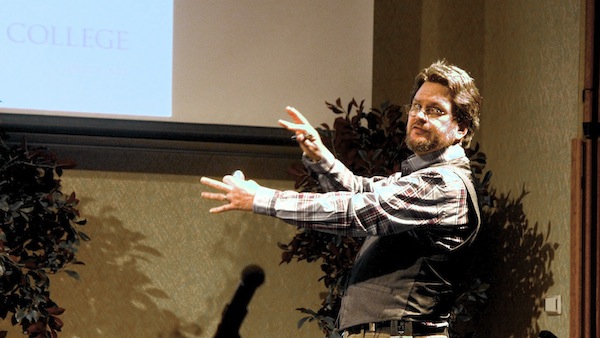Faculty, students and community members attended an event Feb. 6 titled “The Particle Zoo: The Newest Exhibit, the Higgs Boson” given by Matthew Price, assistant professor in the Department of Physics and Astronomy. While the event was aimed toward science majors, the message was about how important particle physics is to everyone.
The information presented in Price’s talk about particle physics, the study of the nature of particles, was complex. Topics included the standard model, a table that shows the dynamics of known subatomic particles as well as the Large Hadron Collider in Europe.
Luke Keller, chair of the Department of Physics and Astronomy, introduced Price by making a joke about the difficulty of particle physics.
“Have you ever heard someone say when something is really easy, ‘it’s not rocket science’?” Keller said. “Have you ever wondered what rocket scientist say? They say it’s not particle physics.”
Addressing the audience, Price expanded on what particle physicists do.
“We go down this path because we want to know what it’s all about … The universe, why we are here,” Price said.
The lecture began with Price explaining particle physics and then moved to discussion about the newly discovered Higgs Boson, the missing part on the fundamental particle chart, which lists all of the particles with unknown structures.
The Large Hadron Collider, the world’s largest and most powerful particle accelerator, was the other main topic covered at the event. Price displayed photographs to expose the size of this $6 billion creation.
“We are looking at the tiniest, most intimate things size-wise on the planet, so to do that we need to build the biggest thing possible,” Price said.
The bulk of the presentation was about content learned beyond undergraduate-level physics, and it was above most of the physics majors’ heads, Price said.
Price elaborated on the importance of particle physics by explaining how everyone and everything is a piece of the universe. He said that he is not just looking at particles, but at the remnants of the Big Bang.
“You might look at this and say, ‘It’s a finger,’ but you can also look at it and say this is the energy memory of the Big Bang,” Price said. “The hydrogen in your finger, the hydrogen you breathe in the air was made in the Big Bang.”
Other physicists have worked on particle physics for more practical reasons. Matthew Sullivan, an associate professor in the Department of Physics and Astronomy, said the finding of anti-electrons ultimately helped create a crucial part of the hospital system in the United States.
“The ‘p’ in PET scan is for positron, which is an anti-electron,” Sullivan said. “So now we actually use antimatter to view inside of the human body without having to cut it open.”
Sullivan said he understood there are skeptics when it comes to building multi-billion dollar colliders like the Large Hadron Collider. But he explained particle physics is an important investment because it helps prepare for the future.
“The justification for people who are not satisfied with just knowing more about the universe is that history has always shown the investment [in particle physics research] is always useful in the future somehow, so we need to invest in it now to learn,” Sullivan said.








